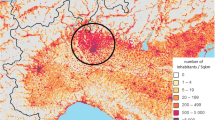Abstract
Food surplus donation has emerged as a popular means to counter the food wastage issue that the world has been facing in recent years. The fact that this also addresses the food insecurity challenge is an added bonus. The matching of the surplus donors with the receivers needs the constant availability of willing volunteers to make this movement a success. An incentive module attracts volunteer participation and ensures their constant availability for the smooth movement of surplus food. While the existing incentive mechanism gets the attention of the volunteers, it fails to account for the degree of activity of the volunteers. This work modifies the incentive scheme to ensure that the activities of the volunteers are taken into consideration. The proposed mechanism manages to discourage inactivity with lower incentives and promote proactivity with higher incentives while disbursing the same total incentive amount taking all volunteers together.
Access this chapter
Tax calculation will be finalised at checkout
Purchases are for personal use only
Similar content being viewed by others
References
Auer P, Cesa-Bianchi N, Fischer P (2002) Finite-time analysis of the multiarmed bandit problem. Mach Learn 47(2):235–256
Babaioff M, Dobzinski S, Oren S, Zohar A (2012) On bitcoin and red balloons. In: Proceedings of the 13th ACM conference on electronic commerce, pp 56–73
Bergström P, Malefors C, Strid I, Hanssen OJ, Eriksson M (2020) Sustainability assessment of food redistribution initiatives in Sweden. Resources 9(3):27
Davies AR, Cretella A, Franck V (2019) Food sharing initiatives and food democracy: practice and policy in three European cities. Polit Govern 7(4):8–20
Eriksson M, Giovannini S, Ghosh RK (2020) Is there a need for greater integration and shift in policy to tackle food waste? insights from a review of European union legislations. SN Appl Sci 2(8):1–13
Esteso A, Alemany M, Ortiz Á (2021) Impact of product perishability on agri-food supply chains design. Appl Math Modell
Ganglbauer E, Fitzpatrick G, Molzer G (2012) Creating visibility: understanding the design space for food waste. In Proceedings of the 11th International conference on mobile and ubiquitous multimedia, pp 1–10
Harvey J, Smith A, Goulding J, Illodo IB (2020) Food sharing, redistribution, and waste reduction via mobile applications: a social network analysis. Ind Mark Manage 88:437–448
Koivunen L, Laato S, Rauti S, Naskali J, Nissilä P, Ojansivu P, Mäkilä T, Norrdal M (2020) Increasing customer awareness on food waste at university cafeteria with a sensor-based intelligent self-serve lunch line. In: 2020 IEEE international conference on engineering, technology and innovation (ICE/ITMC). IEEE, pp 1–9
Messner M, Pavoni N, Sleet C (2012) Recursive methods for incentive problems. Rev Econ Dyn 15(4):501–525
Nagarajan SM, Deverajan GG, Chatterjee P, Alnumay W, Muthukumaran V (2022) Integration of IoT based routing process for food supply chain management in sustainable smart cities. Sustain Urban Areas 76:103448
Nikravech M, Kwan V, Dobernig K, Wilhelm-Rechmann A, Langen N (2020) Limiting food waste via grassroots initiatives as a potential for climate change mitigation: a systematic review. Environ Res Lett
Padmanabhan D, Bhat S, Prabuchandran K, Shevade S, Narahari Y (2022) Dominant strategy truthful, deterministic multi-armed bandit mechanisms with logarithmic regret for sponsored search auctions. Appl Intell 52(3):3209–3226
Roughgarden T (2016) Cs269i: incentives in computer science lecture# 10: Incentives in crowdsourcing
Rut M, Davies AR, Ng H (2020) Participating in food waste transitions: exploring surplus food redistribution in Singapore through the ecologies of participation framework. J Environ Policy & Plann 1–14
Sanyal S, Kumar Singh V, Xhafa F, Sanyal B, Mukhopadhyay S (2021) A game theoretic framework for surplus food distribution in smart cities and beyond. Appl Sci 11(11):5058
Sanyal S, Mukhopadhyay S, Xhafa F, Singh VK, Sanyal B (2022) An incentive framework for surplus food distribution in the context of smart cities. In: International conference on network-based information systems. Springer, pp 35–47
Shi ZR, Yuan Y, Lo K, Lizarondo L, Fang F (2020) Improving efficiency of volunteer-based food rescue operations. In AAAI, pp 13369–13375
Slivkins A et al (2019) Introduction to multi-armed bandits. Found Trends® Mach Learn 12(1-2):1–286
Spicer LC, Patel D, Bodurtha ER, Maslen AM (2020) Surplus food management: a case study. Student Work
Spring CA, Biddulph R (2020) Capturing waste or capturing innovation? comparing self-organising potentials of surplus food redistribution initiatives to prevent food waste. Sustainability 12(10):4252
Zhong R, Xu X, Wang L (2017) Food supply chain management: systems, implementations, and future research. Ind Manag Data Syst
Acknowledgements
Fatos Xhafa’s work is supported by Project “Optimizing Carsharing and Ridesharing Mobility in Smart Sustainable Cities” (grant 21S09355-001) of the Ajuntament of Barcelona and the Fundació “la Caixa” under the framework of the Barcelona Science Plan 2020-2023.
Author information
Authors and Affiliations
Corresponding author
Editor information
Editors and Affiliations
Rights and permissions
Copyright information
© 2023 The Author(s), under exclusive license to Springer Nature Switzerland AG
About this chapter
Cite this chapter
Sanyal, S., Mukhopadhyay, S., Xhafa, F., Kumar Singh, V., Sanyal, B. (2023). Incentives in Surplus Food Distribution for Smart Cities and Beyond: An Activity Aware Solution. In: Shinkuma, R., Xhafa, F., Nishio, T. (eds) Advances in Engineering and Information Science Toward Smart City and Beyond. Engineering Cyber-Physical Systems and Critical Infrastructures, vol 5. Springer, Cham. https://doi.org/10.1007/978-3-031-29301-6_4
Download citation
DOI: https://doi.org/10.1007/978-3-031-29301-6_4
Published:
Publisher Name: Springer, Cham
Print ISBN: 978-3-031-29300-9
Online ISBN: 978-3-031-29301-6
eBook Packages: Intelligent Technologies and RoboticsIntelligent Technologies and Robotics (R0)




